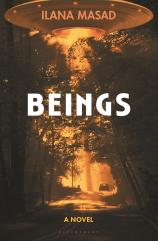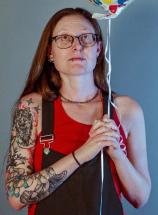Beings
Review
Beings
I was quite taken aback when, upon describing one of the main storylines of Ilana Masad's new novel to my husband, he responded, "Oh, my grandma knew those people."
The first narrative strand introduced in BEINGS is based on the real-life story of Betty and Barney Hill, civil rights activists and (like my husband's grandma) residents of Portsmouth, New Hampshire. After a honeymoon trip to Montreal in the fall of 1961, they reported being followed by a mysterious glowing vessel, and then being abducted by aliens and kept aboard their ship for hours in the White Mountains. As Masad outlines in her book (where the couple is identified just as "the husband" and "the wife"), much of their testimony --- most of it collected while they were under hypnosis --- has shaped countless other alien encounter stories and works of science fiction.
"Like many novels that employ multiple independent narratives, it's perhaps inevitable that each reader will connect with one storyline over the others. But through voice, technique and format, Masad manages to make each one distinct, memorable and more than worthy of readers' attention."
In another of the novel's three main narratives, readers meet one of those science fiction authors, Phyllis, who --- also in the early 1960s --- writes letters to her best friend (and former lover), Rosa, recounting her mix of fear and excitement as she relates the experience of living alone in Boston and starting to explore the city's deeply hidden but still vibrant queer community. Phyllis' letters go unanswered, and her sense of heartbreak is palpable in these sections, which are balanced by her growing dedication to publishing (under a pen name) her science fiction stories and novels. In addition to hiding behind a male pseudonym, Phyllis has to decide how much to disguise the queer plots and themes she is desperate to write about, in a pre-Stonewall society where being gay is still against the law.
The third and final interwoven narrative is set in the present day, where a nonbinary researcher known only as the Archivist is cataloging Phyllis' papers while also struggling against their own loneliness and the pain of their mother's paranoia and conspiracy theories. But the Archivist finds themself at the center of one of those theories when they are contacted by a documentary filmmaker, who says that the Archivist was one of a group of schoolchildren who claimed to have experienced their own alien encounter.
The extraterrestrials who tie together these disparate narratives are not the only unifying strands. Throughout, Masad is playing with the idea of alienness, of outsider status. For the Archivist and Phyllis, it's their gender identity and their sexuality. For the husband and wife, it's the fact that they're an interracial couple at a time when such relationships were vanishingly rare. All three narratives --- which have some overlapping elements but ultimately stand alone --- explore experiences of feeling unseen, mistrusted or alone, and seek to understand what it means to find belonging, especially under circumstances where that belonging can feel elusive at best and impossible at worst.
Like many novels that employ multiple independent narratives, it's perhaps inevitable that each reader will connect with one storyline over the others. But through voice, technique and format, Masad manages to make each one distinct, memorable and more than worthy of readers' attention.
Reviewed by Norah Piehl on October 4, 2025
Beings
- Publication Date: September 23, 2025
- Genres: Fiction, Historical Fiction, Science Fiction
- Hardcover: 304 pages
- Publisher: Bloomsbury Publishing
- ISBN-10: 1639737006
- ISBN-13: 9781639737000




